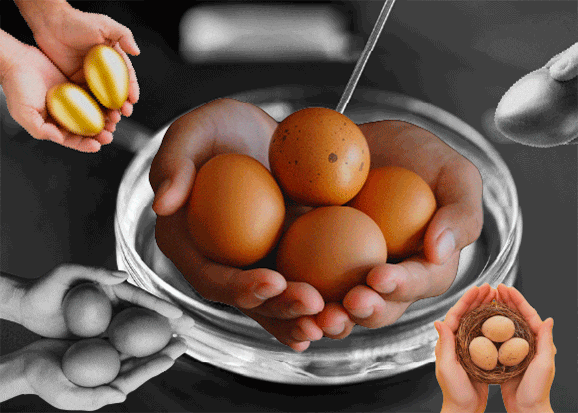How Does Egg Donation Work? And Your Other FAQs Answered

Are you considering using donor eggs for fertility treatment and wondered what the process of fresh egg donation is like?
So are many others. In fact, we recently ran an Instagram poll and discovered that 40% of our fertility community are interested in using donor eggs for fertility treatment.
Yet egg donation is often shrouded in mystery or misunderstanding. Not knowing how the process of egg donation works can be a barrier for some women to donate eggs or for women and couples to receive fresh donor eggs for fertility treatment. So, we’ve spoken to our new The Ribbon Box partners, Altrui & Apricity, to answer common questions about egg donation.
Altrui & Apricity is a fertility clinic with a donor egg agency. The team at Altrui & Apricity believes it’s as important to look after the woman donating eggs as it is caring for the patient receiving donor eggs. All egg donors are guided through the process and support is on hand throughout the egg donation process.
Read on to understand the process of egg donation and have other common questions about using donor eggs for fertility treatment answered.
Written by Holly Pigache
I’d like to use fresh donor eggs in my fertility treatment. How does fresh egg donation work?
Firstly, who can use donor eggs?
To receive donor eggs with Altrui & Apricity, you must fit the following criteria:
- be aged 50 or under
- have a free consultation call (around 30 minutes)
- have a satisfactory medical review by Altrui & Apricity fertility specialists to check your fertility history
The process of receiving donor eggs
There are 5 steps to using donor eggs in fertility treatment:
- Pay the registration fee and have a phone call with an Altrui & Apricity fertility coordinator. In this call you’ll discuss what kind of donor you’re seeking; their physical characteristics, personality, education, hobbies etc.
- Once Altrui & Apricity find an egg donor that matches your criteria, they share as much information with you about the suggested donor as you’d like. Some donor egg recipients choose to receive as much information about their donor as possible in one go, others wish to receive information bit by bit.
- You can accept or decline your offered egg donor – most Altrui & Apricity egg donation recipients are very happy with the matched egg donor. If you decide to not go with the suggested donor, Altrui & Apricity will continue finding you an egg donor.
- When you accept an egg donor for fertility treatment your egg donor will undergo ovarian stimulation and egg retrieval. Altrui & Apricity try to sync both donor and the recipient but usually, it’s very difficult to do, so your donor’s eggs are likely frozen after egg retrieval.
- IVF is done as soon as possible, depending on your cycle.
How long does take to get matched with an egg donor for fertility treatment?
Currently, it takes around four weeks to be matched with an Altrui & Apricity egg donor for fresh donation fertility treatment – but this depends on how specific your donor requirements are and whether a donor comes forward who matches your criteria. If you sign up to be an egg recipient with Altrui & Apricity and are not offered an egg donor within three months, you’ll receive a full refund.
At the beginning of the egg donation process, you’ll speak with a fertility specialist about all the important considerations you’re seeking from an egg donor. This way, Altrui & Apricity can match you with a donor who’ll conceive a child who’ll fit into your family. Altrui & Apricity also go a step further and try to find a donor they think you’ll like and who’d like to give her eggs to you if she knew you.
What information will I receive about my egg donor?
When you are offered a match for your egg donor, you will receive her physical characteristics, information about her background, and if she has children. If Altrui & Apricity have been provided with it, you’ll also receive a photograph of the donor as a baby or a child up to the age of six. The donor will have also written a personal profile which will be shared with you – this can give an insight into her character and why she decided to donate eggs.
How much does it cost to use an egg donor for fertility treatment?
To use an Altrui & Apricity fresh egg donor, the cost is around £3,000 which is more cost-effective than using an egg bank. This is because you receive all eggs from the donor (which is the difference between egg banks that already have the eggs retrieved and stored for purchase). When the Altrui & Apricity egg donors undergo egg collection, fertility specialists typically collect around 15 eggs – all for the egg recipient to use. Averaging 15 donor eggs from a fresh egg collection increases the overall chances of pregnancy as well as genetically-related siblings.
What are the benefits of using an egg donation agency, like Altrui & Apricity vs an egg bank?
Think of an egg bank like a supermarket for eggs. You can choose eggs based on desired qualities of your donor and with an egg bank, you specifically buy six or nine – or whatever specific number you wish to purchase.
With an egg agency like Altrui & Apricity, the best efforts are made to match you with your perfect donor. As a result, you get all your donor’s eggs (averaging at 15 eggs).
Buying six eggs (for example) might be cheaper in the short term, but usually, some eggs don’t fertilise, some embryos don’t survive for implantation and out of those six eggs you might only end up with one viable embryo.
Therefore, with an egg donation agency like Altrui & Apricity, you get as many eggs collected from your egg donor which you can use in future IVF cycles for genetically-related children. Ultimately, this is more cost-effective.
Moreover, traditional egg banks have relatively long waiting times. Altrui & Apricity has lots of egg donors and an average waiting time of four weeks from registration.

I’m thinking of becoming a donor, how do fertility clinics take eggs for donation?
The decision to become an egg donor is a big step and the kindness and generosity of egg donors shouldn’t be forgotten. But when it comes to egg donation how do you donate eggs?
Firstly, who can become an egg donor?
To be an egg donor, you must:
- be aged 18 to 35
- be healthy, with no family history of inherited or serious medical complications or illnesses
- have a BMI <35
- be a non-smoker (having stopped for at least three months)
- not currently be a regular consumer of excessive alcohol or be taking recreational drugs
- not currently be trying to get pregnant yourself.
What’s the process of donating eggs?
There are 5 steps to egg donation:
- Speak with a fertility coordinator to find out if egg donation is right for you
- Discuss the process with the fertility team to make sure the process is clear and to have any questions answered
- Have a medical screening (donors also receive a full fertility assessment for free)
- Be matched with a recipient of your donated eggs
- The donation cycle itself
How do you donate eggs?
The egg donation cycle involves:
- Medical fertility checks and counselling
- Ovarian stimulation
- Egg retrieval through light sedation
How long does the egg donation process take?
The process of egg donation takes around two months – yet the actual donating step takes around two weeks.
Is egg donation a painful process?
No, it’s not painful. It might feel a little uncomfortable (like period cramps) in the final days before the egg retrieval, but the procedure itself should be painless. Egg retrieval uses an anaesthetic to ensure there’s no pain or discomfort. After the procedure is done, egg donors are free to go home immediately.
When asked how they feel after egg retrieval, most donors comment on feeling emotional rather than physically uncomfortable.
How much do you get paid for donating eggs?
The UK government compensates egg donors for their time. The compensation of £750 goes towards expenses like transport or childcare and the rest of the £750 goes to the egg donor.
Hopefully, this article has helped to explain how egg donation work, the process of becoming an egg donor as well as how to use donor eggs for fertility treatment. If you think egg donation is right for you, you can register your interest with Altrui & Apricity.
Sign up to FHH’s newsletter here to receive more expert guidance on fertility treatment.



